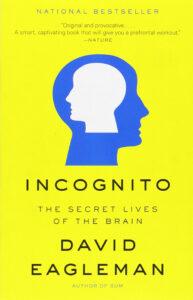Buy the book: Print | Ebook | Audiobook
Or, browse more book summaries
The Book in Three Sentences
Your conscious thoughts play a surprisingly minimal role in determining the course of your life. It is actually your unconscious mind that drives the majority of your actions. Within the unconscious mind exist various conflicting beliefs that vie for control of your conscious behavior. The path your life takes is shaped by a complex interplay between genetic and environmental factors.
Book Summary
In “Incognito: The Secret Lives of the Brain,” neuroscientist David Eagleman explores the hidden workings of the brain and how they shape our perceptions of the world. Drawing on the latest research in neuroscience, psychology, and philosophy, Eagleman argues that our conscious experience is only the tip of the iceberg when it comes to our mental processes. Here are some key ideas from the book:
1. The Brain is a Team of Rivals:
Eagleman suggests that the brain is more like a collection of independent agents than a unified entity. Different parts of the brain compete for control of our thoughts and behaviors, often without our awareness. This leads to a kind of internal conflict that shapes our actions and decisions.
2. The Brain Fills in the Gaps:
Our senses are not a direct window to the world, but rather a set of clues that the brain uses to create a coherent picture of reality. The brain takes shortcuts and makes assumptions to fill in the gaps in our perception, which can sometimes lead to errors or illusions.
3. The Unconscious Mind Rules Our Behavior:
According to Eagleman, the majority of our mental processing happens outside of our conscious awareness. We are not aware of the neural processes that underlie our thoughts, emotions, and actions, but they still influence our behavior. Our unconscious mind is constantly working behind the scenes to guide our behavior and shape our perception of the world.
4. Our Minds Can Be Hacked:
Because our brains are not perfect and are vulnerable to manipulation, advertisers, politicians, and others can exploit our mental processes to influence our behavior. By tapping into our emotional responses and biases, they can sway our opinions and decisions without our knowledge.
5. The Brain is Plastically Moldable:
The brain is not fixed and unchanging, but is rather constantly adapting and evolving. Our experiences can shape the structure and function of our brains, which in turn can shape our behavior and perception. This means that we have the power to consciously reshape our own minds through deliberate effort and training.
Overall, “Incognito” challenges us to question our assumptions about the nature of consciousness, and to recognize the hidden processes that shape our experience of the world. Eagleman argues that by understanding the workings of our own minds, we can gain greater control over our behavior and improve our decision-making abilities.
Important quotes










About Author of "Incognito"
David Eagleman is a renowned American neuroscientist, writer, and presenter. He was born on April 25, 1971, in New Mexico, USA. Eagleman received his Bachelor’s degree in British and American literature from Rice University in Houston and a PhD in Neuroscience from Baylor College of Medicine. He is currently a professor of Neuroscience and Psychiatry at Stanford University, where he runs a laboratory studying time perception, synesthesia, and the intersection of neuroscience with the legal system.
Eagleman is also an accomplished author, having written several popular science books, including “Sum: Forty Tales from the Afterlives,” “Incognito: The Secret Lives of the Brain,” and “The Brain: The Story of You.” He has been widely recognized for his contributions to science and literature, receiving numerous awards and honors, including the Science Educator Award from the Society for Neuroscience and being named one of the “100 Most Creative People in Business” by Fast Company magazine. Additionally, he has served as a science advisor for several television series, including “The Brain with David Eagleman” on PBS.
Buy the book: Print | Ebook | Audiobook
Or, browse more book summaries

